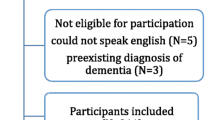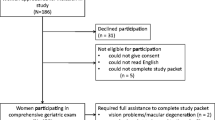Abstract
Purpose of Review
Cognitive impairment and pelvic floor disorders (PFDs) more frequently affect older women. We aimed to review recent literature on challenges of providing treatment for women with pelvic floor disorders and cognitive impairment, including risks to those with cognitive impairment, challenges in treatment, and non-pharmacologic treatment options.
Recent Findings
Prevalence of cognitive impairment in women seeking PFD treatment ranges between 4.3 and 29.3%. Women with cognitive impairment and urgency incontinence are at risk of cognitive changes from antimuscarinics, and polypharmacy in treatment of incontinence as an adverse effect from acetylcholinesterase inhibitor treatment for dementia. Additionally, older age and cognitive impairment appear to be risk factors for poorer surgical outcomes in urogynecologic surgery. There are no non-pharmacologic care methods with strong evidence to show improved outcomes in women with PFDs and cognitive impairment.
Summary
We are improving our understanding of the challenges in caring for women with urgency incontinence and cognitive impairment, but data is lacking regarding the care of these patients who have pelvic organ prolapse and anal incontinence. More research of interventions to help caregivers is needed to provide directive guidelines that could improve PFD outcomes and caregiver experience.
Similar content being viewed by others
References
Papers of particular interest, published recently, have been highlighted as: • Of importance •• Of major importance
Nygaard I, Barber MD, Burgio KL, Kenton K, Meikle S, Schaffer J, et al. Prevalence of symptomatic pelvic floor disorders in US women. JAMA. 2008;300(11):1311–6. https://doi.org/10.1001/jama.300.11.1311.
Drennan VM, Rait G, Cole L, Grant R, Iliffe S. The prevalence of incontinence in people with cognitive impairment or dementia living at home: a systematic review. Neurourol Urodyn. 2013;32(4):314–24. https://doi.org/10.1002/nau.22333.
•• Trowbridge ER, Kim D, Barletta K, Fitz V, Larkin S, Hullfish KL. Prevalence of positive screening test for cognitive impairment among elderly urogynecologic patients. Am J Obstet Gynecol. 2016;215(5):663.e1–6. https://doi.org/10.1016/j.ajog.2016.06.012. A strong paper that is one of the few available that we have to guide our understanding of the prevelance of cognitive impairment in pelvic floor disorders.
•• Kunkle CM, Abernethy MG, Van Tongeren LR, Fashokun TB, Wright EJ, Chen CC. Prevalence of cognitive impairment in older women with pelvic floor disorders. Int Urogynecol J. 2017; https://doi.org/10.1007/s00192-017-3322-7. A strong paper that is one of the few available that we have to guide our understanding of the prevelance of cognitive impairment in pelvic floor disorders in a slightly younger population than the Trowbridge et al paper.
•• Erekson EA, Fried TR, Martin DK, Rutherford TJ, Strohbehn K, Bynum JP. Frailty, cognitive impairment, and functional disability in older women with female pelvic floor dysfunction. Int Urogynecol J. 2015;26(6):823–30. https://doi.org/10.1007/s00192-014-2596-2. A very interesting and formative paper regarding two of the issues that we may encounter in urogynecologic population.
•• Nieto ML, Kisby C, Matthews CA, Wu JM. The evaluation of baseline physical function and cognition in women undergoing pelvic floor surgery. Female pelvic medicine & reconstructive surgery. 2016;22(1):51–4. https://doi.org/10.1097/spv.0000000000000223. This is a helpful paper in understanding the cognitive status of the specific population of those seeking surgical treatment in the urogynecologic population.
Plassman BL, Langa KM, Fisher GG, Heeringa SG, Weir DR, Ofstedal MB, et al. Prevalence of dementia in the United States: the aging, demographics, and memory study. Neuroepidemiology. 2007;29(1–2):125–32. https://doi.org/10.1159/000109998.
Ransmayr GN, Holliger S, Schletterer K, Heidler H, Deibl M, Poewe W, et al. Lower urinary tract symptoms in dementia with Lewy bodies, Parkinson disease, and Alzheimer disease. Neurology. 2008;70(4):299–303. https://doi.org/10.1212/01.wnl.0000296826.61499.26.
•• Averbeck MA, Altaweel W, Manu-Marin A, Madersbacher H. Management of LUTS in patients with dementia and associated disorders. Neurourol Urodyn. 2017;36(2):245–52. https://doi.org/10.1002/nau.22928. A very thorough review of both pharmacologic and non-pharmacologic treatment options for lower urinary tract symptoms in patients with different types of dementia.
•• American Geriatrics Society. Amerian Geriatrics Society 2015 updated beers criteria for potentially inappropriate medical use in older adults. J Am Geriatr Soc. 2015;63(11):2227–46. https://doi.org/10.1111/jgs.13702. This is a useful guide that details medications that providers who treat an elderly population should have handy to avoid prescribing unneccesary medications that put the patient at risk, or combining medications that may have harmful interactions.
•• Gray SL, Anderson ML, Dublin S, Hanlon JT, Hubbard R, Walker R, et al. Cumulative use of strong anticholinergics and incident dementia: a prospective cohort study. JAMA Intern Med. 2015;175(3):401–7. https://doi.org/10.1001/jamainternmed.2014.7663. This was a very important and strong study tying together the risk of higher long-term cumulative dosages of anticholinergics.
Kay G, Crook T, Rekeda L, Lima R, Ebinger U, Arguinzoniz M, et al. Differential effects of the antimuscarinic agents darifenacin and oxybutynin ER on memory in older subjects. Eur Urol. 2006;50(2):317–26. https://doi.org/10.1016/j.eururo.2006.03.057.
Geller EJ, Crane AK, Wells EC, Robinson BL, Jannelli ML, Khandelwal CM, et al. Effect of anticholinergic use for the treatment of overactive bladder on cognitive function in postmenopausal women. Clin Drug Investig. 2012;32(10):697–705. https://doi.org/10.2165/11635010-000000000-00000.
•• Gill SS, Mamdani M, Naglie G, Streiner DL, Bronskill SE, Kopp A, et al. A prescribing cascade involving cholinesterase inhibitors and anticholinergic drugs. Arch Intern Med. 2005;165(7):808–13. https://doi.org/10.1001/archinte.165.7.808. Well-written and informative study on the cascade that can occur with cholinesterase inhibitors and subsquently anticholinergics.
•• Green AR, Segal J, Tian J, Oh E, Roth DL, Hilson L, et al. Use of bladder antimuscarinics in older adults with impaired cognition. J Am Geriatr Soc. 2017;65(2):390–4. https://doi.org/10.1111/jgs.14498. This was an important study to contextualize the rate of prescription of antimuscarinincs in the exact population that this paper meant to evaluate.
Samuelsson E, Odeberg J, Stenzelius K, Molander U, Hammarstrom M, Franzen K, et al. Effect of pharmacological treatment for urinary incontinence in the elderly and frail elderly: a systematic review. Geriatr Gerontol Int. 2015;15(5):521–34. https://doi.org/10.1111/ggi.12451.
Drennan VM, Greenwood N, Cole L, Fader M, Grant R, Rait G, et al. Conservative interventions for incontinence in people with dementia or cognitive impairment, living at home: a systematic review. BMC Geriatr. 2012;12:77. https://doi.org/10.1186/1471-2318-12-77.
Jirovec MM, Templin T. Predicting success using individualized scheduled toileting for memory-impaired elders at home. Research in nursing & health. 2001;24(1):1–8.
• Hagglund D. A systematic literature review of incontinence care for persons with dementia: the research evidence. J Clin Nurs. 2010;19(3–4):303–12. https://doi.org/10.1111/j.1365-2702.2009.02958.x. A very good review on the non-pharmacologic options that exist for patients with incontinence and dementia.
Rose A, Thimme A, Halfar C, Nehen HG, Rubben H. Severity of urinary incontinence of nursing home residents correlates with malnutrition, dementia and loss of mobility. Urol Int. 2013;91(2):165–9. https://doi.org/10.1159/000348344.
• Bretschneider CE, Robinson B, Geller EJ, Wu JM. The effect of age on postoperative morbidity in women undergoing urogynecologic surgery. Female pelvic medicine & reconstructive surgery. 2015;21(4):236–40. https://doi.org/10.1097/spv.0000000000000150. This paper was important in establishing a recent link between a harmful outcome and the risk factor of age.
Robinson TN, Wu DS, Pointer LF, Dunn CL, Moss M. Preoperative cognitive dysfunction is related to adverse postoperative outcomes in the elderly. J Am Coll Surg. 2012;215(1):12–17; discussion 7-8. https://doi.org/10.1016/j.jamcollsurg.2012.02.007.
Sung VW, Weitzen S, Sokol ER, Rardin CR, Myers DL. Effect of patient age on increasing morbidity and mortality following urogynecologic surgery. Am J Obstet Gynecol. 2006;194(5):1411–7. https://doi.org/10.1016/j.ajog.2006.01.050.
• Unger CA, Hickman LC, Mitchell-Handley B, Barber MD, Ridgeway B. The incidence of perioperative adverse events in the very elderly undergoing urogynecologic surgery. Female pelvic medicine & reconstructive surgery. 2016;22(6):425–9. https://doi.org/10.1097/SPV.0000000000000309. This is the only study that we were able to find that investigates surgical outcomes with dementia as a variable in the urogynecologic literature.
Arias BE, Ridgeway B, Barber MD. Complications of neglected vaginal pessaries: case presentation and literature review. Int Urogynecol J Pelvic Floor Dysfunct. 2008;19(8):1173–8. https://doi.org/10.1007/s00192-008-0574-2.
Gray M, Beeckman D, Bliss DZ, Fader M, Logan S, Junkin J, et al. Incontinence-associated dermatitis: a comprehensive review and update. Journal of wound, ostomy, and continence nursing : official publication of The Wound, Ostomy and Continence Nurses Society. 2012;39(1):61–74. https://doi.org/10.1097/WON.0b013e31823fe246.
Goodman C, Rycroft Malone J, Norton C, Harari D, Harwood R, Roe B, et al. Reducing and managing faecal incontinence in people with advanced dementia who are resident in care homes: protocol for a realist synthesis. BMJ Open. 2015;5(7):e007728. https://doi.org/10.1136/bmjopen-2015-007728.
Gove D, Scerri A, Georges J, van Houten P, Huige N, Hayder-Beichel D, et al. Continence care for people with dementia living at home in Europe: a review of literature with a focus on problems and challenges. J Clin Nurs. 2017;26(3–4):356–65. https://doi.org/10.1111/jocn.13582.
Kohler M, Schwarz J, Burgstaller M, Saxer S. Incontinence in nursing home residents with dementia: influence of an educational program and nursing case conferences. Z Gerontol Geriatr. 2016; https://doi.org/10.1007/s00391-016-1120-3.
Bliss D, Rolnick C, Jackson J, Arntson C, Mullins J, Hepburn K. Health literacy needs related to incontinence and skin damage among family and friend caregivers of individuals with dementia. Journal of wound, ostomy, and continence nursing : official publication of The Wound, Ostomy and Continence Nurses Society. 2013;40(5):515–23. https://doi.org/10.1097/WON.0b013e3182a3ff24.
Author information
Authors and Affiliations
Corresponding author
Ethics declarations
Conflict of Interest
Abhishek A. Sripad and Samantha J. Pulliam declare that they have no conflict of interest.
Human and Animal Rights and Informed Consent
This article does not contain any studies with human or animal subjects performed by any of the authors.
Additional information
This article is part of the Topical Collection on Urogynecology
Rights and permissions
About this article
Cite this article
Sripad, A.A., Pulliam, S.J. Cognitive Impairment and Pelvic Floor Disorders. Curr Obstet Gynecol Rep 6, 263–268 (2017). https://doi.org/10.1007/s13669-017-0223-1
Published:
Issue Date:
DOI: https://doi.org/10.1007/s13669-017-0223-1




